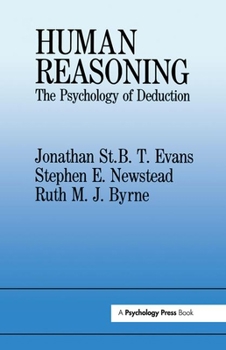Human Reasoning: The Psychology of Deduction
Select Format
Select Condition 
Book Overview
Deductive reasoning is widely regarded as an activity central to human intelligence, and as such has attracted an increasing amount of psychological study in recent years. In this first major survey of the field for over a decade, the authors provide a detailed and balanced review of all the main kinds of deductive reasoning task studied by psychologists. Topics covered include conditional and disjunctive reasoning, the Wason selection task, relational inference and reasoning with syllogisms and quantifiers. Throughout the review, a careful distinction is drawn between the main empirical findings in the field and the major theoretical approaches proposed to account for these findings. Discussion of experimental findings is organized around three central questions: What is the extent and limitation of human competence in deductive reasoning? What factors are responsible for systematic errors and biases on reasoning tasks? How is human reasoning influenced by the content in which logical problems are presented? Four major classes of theory are discussed throughout the book. The long established theory that people have a mental logic comprised of formal rules of inference is contrasted particularly with the recently developed mental model theory of deductive reasoning. Explanations of many phenomena, especially biases, are also considered in terms of heuristic processes. Finally, consideration is given to accounts of content and context effects based upon the use of domain sensitive rules or schemas. The book ends with a discussion of research on deductive reasoning in the context of the current debate about human rationality.
Format:Paperback
Language:English
ISBN:0863773141
ISBN13:9780863773143
Release Date:June 1993
Publisher:Psychology Press
Length:320 Pages
Weight:1.05 lbs.
Dimensions:0.8" x 6.7" x 9.0"
Related Subjects
PsychologyCustomer Reviews
0 rating





